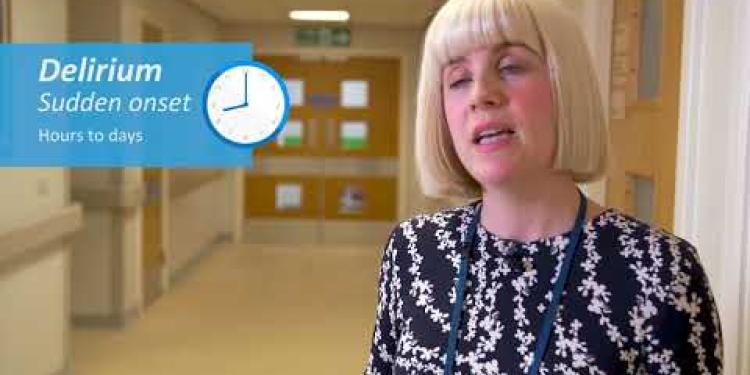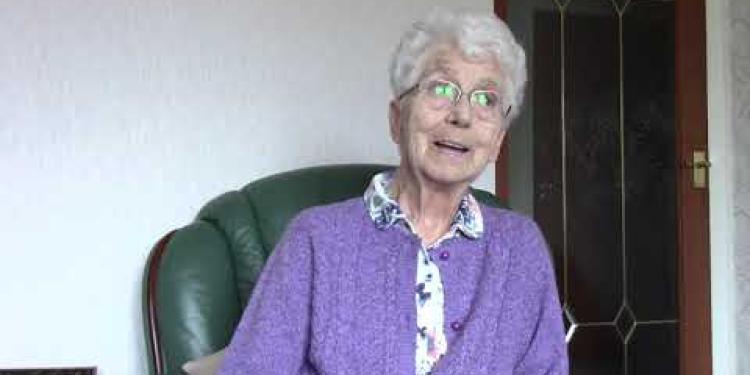Important Information On Using This Service
- Ergsy carefully checks the information in the videos we provide here.
- Videos shown by YouTube after a video has completed have NOT been reviewed by ERGSY.
- To view, click the arrow in the center of the video.
Using Subtitles and Closed Captions
- Most of the videos you find here will have subtitles and/or closed captions available.
- You may need to turn these on and choose your preferred language.
Turn Captions On or Off
- Go to the video you'd like to watch.
- If closed captions (CC) are available, settings will be visible on the bottom right of the video player.
- To turn on captions, click settings.
- To turn off captions, click settings again.
Find A Professional
Experiencing Delirium After Surgery
Understanding Postoperative Delirium
Postoperative delirium is a common, yet often under-recognised complication that can arise after surgical procedures, particularly in older adults. Delirium is characterised by sudden and severe confusion, fluctuating levels of consciousness, and disorganized thinking. This condition can be distressing for patients and their families, and can lead to longer hospital stays and increased healthcare costs in the United Kingdom.
Causes of Delirium After Surgery
Several factors can contribute to the development of delirium following surgery. These include the effects of anaesthesia, pain medications, and the physical stress of surgery itself. Additional risk factors include pre-existing cognitive impairments, advanced age, dehydration, infections, and poor postoperative pain management. It is essential to identify and manage these factors to minimise the risk of delirium.
Recognising the Symptoms
Symptoms of postoperative delirium can vary widely but often include confusion, inattention, disorganized thinking, and fluctuating levels of alertness. Patients may also experience hallucinations or delusions, which can be particularly frightening. Identifying delirium early is crucial for effective management and improved outcomes.
Management and Treatment
Effective management of postoperative delirium involves a multi-faceted approach. Ensuring optimal pain control, maintaining hydration, and providing a calm and familiar environment can help mitigate symptoms. Non-pharmacological interventions, including reorientation techniques and cognitive stimulation, are beneficial. In some cases, the use of antipsychotic medications may be necessary, but these should be used with caution and under strict medical supervision.
Preventative Measures
Preventing delirium after surgery requires a proactive approach. Preoperative assessments to identify at-risk patients, optimising health conditions before surgery, and involving multidisciplinary teams can make a significant difference. Early mobilisation, adequate lighting, and frequent orientation cues during the hospital stay can also be effective.
Importance of Support Systems
Support from family and healthcare providers is vital in managing and preventing delirium. Family members can play a crucial role by offering reassurance and helping with reorientation techniques. Healthcare providers, including nurses and therapists, need to be adequately trained to identify at-risk patients and implement preventative strategies.
Conclusion
Experiencing delirium after surgery can be a challenging and distressing ordeal. Understanding its causes, recognising symptoms early, and implementing effective management strategies are crucial steps in improving patient outcomes. In the United Kingdom, where the aging population is growing, addressing postoperative delirium proactively is of paramount importance to enhance the quality of surgical care.
Experiencing Delirium After Surgery
Understanding Postoperative Delirium
Sometimes, after surgery, people can feel very confused. This is called delirium. It happens a lot, especially for older people. Delirium means having a hard time thinking clearly and being aware of what is around you. It can be scary for the person and their family. It can also make the hospital stay longer and more expensive in the UK.
Causes of Delirium After Surgery
There are things that can cause delirium after surgery. These include the medicine to make you sleep during surgery, pain medicine, and the stress from surgery. Other things that can make delirium worse are having trouble with memory before surgery, being older, not drinking enough water, infections, and bad pain control after surgery. It is important to find and fix these things to stop delirium.
Recognising the Symptoms
Signs of delirium after surgery can be different for everyone. Often, a person may feel very confused, have trouble paying attention, and think in a disorganized way. They may also see or hear things that are not there, which can be very scary. Seeing these signs early is important to help the person get better.
Management and Treatment
Helping someone with delirium needs different approaches. Making sure they are not in pain, giving them enough water, and keeping things calm and familiar around them can help. Doing activities that help them think clearly is good too. Sometimes, doctors may give medicine carefully. Family and doctors should help make decisions together.
Preventative Measures
To stop delirium from happening, doctors need to plan ahead. They check who might have a higher chance of getting delirium before surgery. Making sure people are healthy before surgery helps a lot. After surgery, getting up and moving around, having good lighting, and reminding people where they are can help prevent delirium.
Importance of Support Systems
Family and healthcare workers are important in helping with delirium. Family can reassure the person and help them remember things. Nurses and therapists need to know how to see the signs of delirium and help stop it before it starts. They should work together to help the person recover.
Conclusion
Delirium after surgery can be hard to deal with. Knowing what causes it, spotting the signs early, and taking steps to manage it are very important. In the UK, where there are more older people, dealing with delirium is very important to make sure people get good care after surgery.
Frequently Asked Questions
What is delirium?
Delirium is a serious disturbance in mental abilities resulting in confused thinking and reduced awareness of the environment. It can occur suddenly and is a common complication after surgery, particularly in older adults.
What are the symptoms of delirium after surgery?
Symptoms of post-surgical delirium can include confusion, restlessness, agitation, hallucinations, lack of concentration, and memory problems. These symptoms can fluctuate throughout the day.
How long does post-operative delirium last?
The duration of post-operative delirium varies. It can last from a few hours to several days or even weeks. Prompt medical attention usually helps to reduce the duration and severity.
Who is at risk of experiencing delirium after surgery?
Older adults, individuals with pre-existing cognitive impairments, those with multiple medical conditions, and patients undergoing major or emergency surgery are at higher risk of developing delirium after surgery.
Can delirium be prevented?
While it might not always be possible to prevent delirium, certain strategies can reduce the risk. These include managing pain effectively, ensuring proper hydration and nutrition, and providing a calm and well-lit environment.
What causes post-surgical delirium?
The exact cause is often multifactorial, involving a combination of factors such as the type and duration of surgery, anesthesia, medication, metabolic imbalances, infections, and the patient's overall health.
How is delirium diagnosed?
Healthcare professionals use a combination of medical history, physical and neurological exams, and cognitive tests to diagnose delirium. They may also rule out other conditions that can mimic delirium, such as dementia or psychiatric disorders.
What treatments are available for delirium?
Treatment typically involves addressing the underlying cause, such as infections or metabolic imbalances. Supportive care, including reorientation techniques, ensuring a calm environment, and managing symptoms with medication if necessary, is also crucial.
Is delirium the same as dementia?
No, delirium and dementia are different conditions. Delirium is a sudden, often reversible change in mental status, whereas dementia is a chronic, progressive decline in cognitive function.
Can anaesthesia contribute to delirium?
Yes, anesthesia can contribute to delirium, particularly in older adults and those with pre-existing cognitive impairments. The effects of anesthesia on the brain can lead to confusion and disorientation.
What should I do if I notice symptoms of delirium in a loved one post-surgery?
Contact the healthcare team immediately if you notice symptoms of delirium in a loved one after surgery. Early intervention can help manage symptoms and address underlying causes effectively.
Are there any long-term effects of post-surgical delirium?
While many individuals recover fully from delirium, some may experience prolonged cognitive impairments. The risk of long-term effects is higher in older adults and those with pre-existing cognitive conditions.
Does hospital environment impact the risk of delirium?
Yes, a hospital environment can impact the risk of delirium. Factors such as unfamiliar surroundings, frequent disruptions, and inadequate lighting can contribute to confusion and disorientation.
Can dehydration lead to delirium after surgery?
Dehydration is a common contributing factor to delirium after surgery. Ensuring adequate fluid intake is crucial for preventing and managing delirium.
How can family members help in managing delirium?
Family members can help by providing a familiar and calming presence, assisting with reorientation, encouraging hydration and nutrition, and communicating concerns to healthcare providers.
What is delirium?
Delirium is when a person's brain gets a bit confused. It can happen really fast. People might be unsure about where they are, or what time it is. They might see or hear things that are not there.
If you think someone has delirium, it's important to talk to a doctor. Doctors can help with medicine or special care.
Using pictures or speaking slowly can help people with delirium understand better. It's good to be patient and calm when talking to someone with delirium.
Delirium is when your brain gets mixed up and it becomes hard to think clearly. You might feel very confused and not notice what's happening around you. It can happen very quickly, like right after an operation, and it often affects older people.
What happens with delirium after an operation?
Delirium is when someone gets confused. It can happen after surgery. Here are some signs:
- Feeling mixed up or not sure where you are.
- Talking in a way that does not make sense.
- Seeing things that are not really there.
- Having a hard time staying awake.
- Being restless or upset.
If you notice these signs, tell a doctor or nurse. They can help. You can also use pictures or simple words to talk about how you feel. Asking someone you trust to stay with you can also help.
After surgery, some people might feel very mixed up or see things that are not there. They might feel jumpy or nervous. It can be hard for them to sit still or focus on something. Sometimes, they might even forget things. These feelings can get better or worse during the day.
A helpful way to cope is to have a quiet space to rest. A favorite toy or blanket can help too. Listening to soft music or breathing deeply can make you feel calmer. If things don't get better, it's a good idea to ask for help from a nurse or doctor.
How long does confusion after surgery last?
People can feel confused after surgery. This is called delirium. It does not last forever. Here are some things to know:
- Delirium can go away in a few hours or days.
- Sometimes it takes a week or more to feel better.
- Rest and quiet can help someone feel better.
Using pictures, videos, or a buddy can help understand things better.
After surgery, some people may feel confused. This is called delirium. It can last a short time, like a few hours. Sometimes, it can go on for days or weeks. Getting help from a doctor quickly can make it go away faster and make it less serious.
Who might feel confused after surgery?
Older people, people who already have problems with thinking, those with many health problems, and people having big or emergency surgeries are more likely to get confused after surgery.
Can we stop delirium?
Delirium is when someone gets confused. They might see or hear things that are not there.
Good news! We can help stop delirium from happening.
- Make sure the person drinks enough water.
- Help them get good sleep with a quiet, cozy place.
- Remind them of where they are and what day it is.
- Get them to talk and walk a little each day if they can.
- Ask doctors to check their medicines. Some medicines can cause confusion.
We can use pictures or alarms to help people remember things better.
Sometimes, we can't stop delirium from happening. But there are some things we can do to make it less likely.
One thing is to help people with pain. We can give them medicine to feel better.
Another thing is to make sure they drink enough water and eat healthy food.
It's also good to keep the room calm and bright. This helps people feel more relaxed and less confused.
What makes someone confused after surgery?
Surgery can make some people feel mixed up or not think clearly. This is called post-surgical delirium.
Here are some things that can cause it:
- Being very tired.
- Pain from the surgery.
- Not sleeping well.
- Taking new medicine.
- Being in a new place, like a hospital.
If you or someone you know feels confused after surgery, tell a doctor or nurse. They can help make things better.
Talking to someone you trust and using calm breathing can help too.
The cause can be many things. It might be because of:
- The kind of surgery.
- How long the surgery takes.
- The medicine used for sleep during surgery (anesthesia).
- Other medicines.
- Problems with body chemicals (metabolic imbalances).
- Infections.
- How healthy the person is overall.
It is important to look at all these things. Sometimes using helpful tools like pictures or simple lists can make it easier to understand.
How do doctors know if someone has delirium?
Doctors check if someone has delirium by looking for sudden changes in how the person thinks and acts. They may ask questions to see if the person is confused or having trouble paying attention.
Doctors often talk to family members or caregivers to learn more about these changes. They might also run tests to make sure it's not another illness causing the symptoms.
Some helpful tools for understanding and support include:
- Drawing pictures or using simple words to explain.
- Using apps or videos that explain health topics in simple language.
- Asking a trusted friend or family member to help explain things.
Doctors and nurses look at your health history. They check your body and how your brain works. They also give you thinking tests to find out if you have delirium. They make sure it isn’t something else like dementia or mental health problems.
What can help someone with delirium?
Delirium is when someone gets very confused. Here are some things that can help:
- Doctors can give medicine to help.
- Make sure the person drinks enough water.
- Help them rest and sleep well.
- Keep the room quiet and calm.
To help someone feel better, doctors try to fix what is causing the problem, like an infection or body balance issue. It's important to give extra help, like reminding the person where they are or making the place quiet and calm. If needed, medicine can help with the symptoms too.
Are delirium and dementia the same?
No, they are not the same. Let's see the differences:
Delirium:
- It can start quickly, in a few hours or days.
- People might feel confused or see things that are not there.
- It can get better with treatment.
Dementia:
- It happens slowly, over months or years.
- People might have trouble remembering things or talking.
- It doesn't go away, but there are ways to help.
You can ask a doctor for more help or use tools like pictures and simple words to understand better.
No, delirium and dementia are not the same.
Delirium: This happens suddenly. It can get better. It makes thinking and understanding tricky for a little while.
Dementia: This happens slowly over time. It keeps getting worse. It makes it hard to remember things and to understand.
You can use things like picture cards or apps with voice help to understand more.
Can medicine that makes you sleep cause confusion?
Yes, anesthesia can make people feel confused, especially older people or those who already have trouble thinking clearly. Anesthesia can make the brain feel mixed up and not know where it is.
If you or someone you know experiences confusion after anesthesia, here are some helpful tips: - Stay calm and talk slowly. - Use short and simple sentences. - Make sure the room is quiet and comfortable. - Ask a doctor or nurse for advice.
What if my loved one is confused after surgery?
If your loved one seems confused after surgery, here is what you can do:
- Stay calm and talk to them in a gentle voice.
- Make sure they are comfortable and safe.
- Write down what you notice, like how they act and for how long.
- Tell a doctor or nurse what you see.
- Ask the doctor to check if they have delirium.
It can help to use pictures or videos to explain things.
You can also keep a note of questions to ask the doctor.
If you see a family member acting confused after surgery, tell the doctor or nurse right away. Getting help fast can make it easier to treat and find out what is causing the problem.
Can you have long-term problems after feeling confused after surgery?
Some people get all better after having delirium. But some people might still have trouble thinking clearly for a longer time. Older people and those who already have trouble with their thinking are more likely to have these long-lasting effects.
Does the hospital setting affect the chance of delirium?
This question asks if being in a hospital can change how likely a person is to become confused or disoriented (this is called delirium). It is important because understanding this can help care for people better.
To make it easier to think about this question, consider:
- What is delirium? Delirium is when someone gets confused and can't think clearly. It might happen when they are sick or in a different place.
- Why might a hospital setting matter? Hospitals are busy and noisy, which can be hard for some people. This might make delirium more likely.
Here are some ways to help prevent delirium:
- Calm environment: Try to keep the hospital room quiet. Bring a favorite blanket or pillow to make it feel more like home.
- Bring familiar things: Having photos, music, or books from home can help feel more comfortable.
If you or someone you care about is in the hospital, talk with nurses or doctors about preventing delirium.
Yes, being in a hospital can sometimes make confusion worse. Strange places, lots of noise, and not enough light can make it hard to think clearly and feel lost.
Can not drinking enough water make you confused after surgery?
Not drinking enough water can make people feel confused after surgery. It is important to drink enough so this doesn’t happen.
How can family members help with delirium?
Family members can help if someone has delirium. Here are some ways:
- Sit with the person and talk to them. It helps them feel safe.
- Make sure the room is quiet and calm.
- Help them remember things. Tell them the day and where they are.
- Bring familiar things from home, like photos or a favorite blanket.
- Listen to them and be patient.
- If you are worried, talk to a doctor or nurse.
- You can use pictures, videos, or apps that explain things simply to help understand and manage delirium.
These steps can make a big difference!
Family members can help in these ways:
- Stay close and be calm to make the person feel safe.
- Remind the person where they are and what is happening.
- Offer drinks and food to keep them healthy.
- Talk to the doctors or nurses if you have any worries.
Useful Links
Useful links from: What is Delirium
- NHS - Delirium An overview of delirium, its symptoms, causes, diagnosis, and treatment options provided by the National Health Service (NHS).
- Age UK - Delirium Information on delirium, including symptoms, causes, prevention, and how to care for someone with delirium, provided by Age UK, a leading charity for older people.
- Alzheimer's Society - Delirium Details about delirium, especially in the context of dementia, including its symptoms, causes, and ways to manage it, provided by the Alzheimer's Society.
- Mind - Delirium Information about delirium, its symptoms, treatment, and support for those affected provided by Mind, a mental health charity in the UK.
Useful links from: How do you spot delirium
- NHS - Delirium This NHS page provides detailed information on delirium, including symptoms, causes, diagnosis, treatment, and when to seek medical advice.
- Age UK - What is Delirium? This Age UK page offers a comprehensive overview of delirium, including risk factors, symptoms, and tips for caregivers on how to manage and support someone with delirium.
- Alzheimer's Society - Delirium This Alzheimer's Society page explains the relationship between delirium and dementia, with advice on recognizing symptoms, preventative measures, and managing delirium in individuals with dementia.
- Mind - Understanding Delirium This Mind page provides an in-depth look at delirium, detailing causes, symptoms, treatments, and advice on what to do if you’re experiencing or caring for someone with delirium.
Useful links from: Delirium: A Patient Story at Leicester's Hospitals
- NHS: Delirium NHS guide on understanding delirium, including its symptoms, causes, and treatments.
- Leicester's Hospitals: Delirium Information from Leicester's Hospitals detailing what delirium is, as well as patient stories and care guidelines.
- Age UK: Understanding and Managing Delirium Age UK offers insights into the causes, symptoms, and management of delirium, especially in older people.
- Alzheimer's Society: Delirium The Alzheimer's Society provides information on how delirium is related to dementia, its impacts, and guidance for caregivers.
Useful links from: What is delirium
- NHS - Delirium Comprehensive guide on delirium, including symptoms, causes, and treatments, provided by the National Health Service (NHS).
- Alzheimer's Society - Delirium Information about delirium from the Alzheimer's Society, including how it differs from dementia and tips for managing it.
- Age UK - Delirium Age UK's resource on delirium, discussing its impact on older adults, prevention strategies, and how to support someone with delirium.
- Mind - Delirium Mind's page on delirium, including its mental health implications, signs to watch for, and available support options.
Useful links from: The Delirium Question on Patientrack
- NHS - Delirium Overview This page provides an overview of delirium, including its causes, diagnosis, and treatment options.
- NHS Scotland - Delirium Toolkit NHS Scotland's Delirium Toolkit offers a comprehensive guide for healthcare professionals on managing and preventing delirium.
- Age UK - Delirium Support Age UK's resource on delirium provides information on understanding and managing the condition in older adults.
- Alzheimer's Society UK - Delirium and Dementia The Alzheimer's Society explains the link between delirium and dementia, and offers advice on addressing these conditions.
More Videos of Interestdiagnosis
Have you found an error, or do you have a link or some information you would like to share? Please let us know using the form below.
- Ergsy carfully checks the information in the videos we provide here.
- Videos shown by Youtube after a video has completed, have NOT been reviewed by ERGSY.
- To view, click the arrow in centre of video.
- Most of the videos you find here will have subtitles and/or closed captions available.
- You may need to turn these on, and choose your preferred language.
- Go to the video you'd like to watch.
- If closed captions (CC) are available, settings will be visible on the bottom right of the video player.
- To turn on Captions, click settings .
- To turn off Captions, click settings again.





